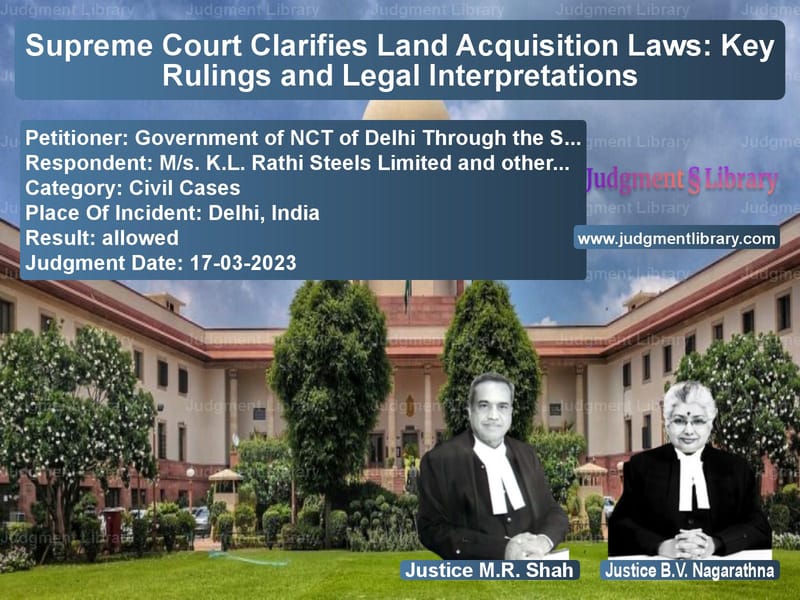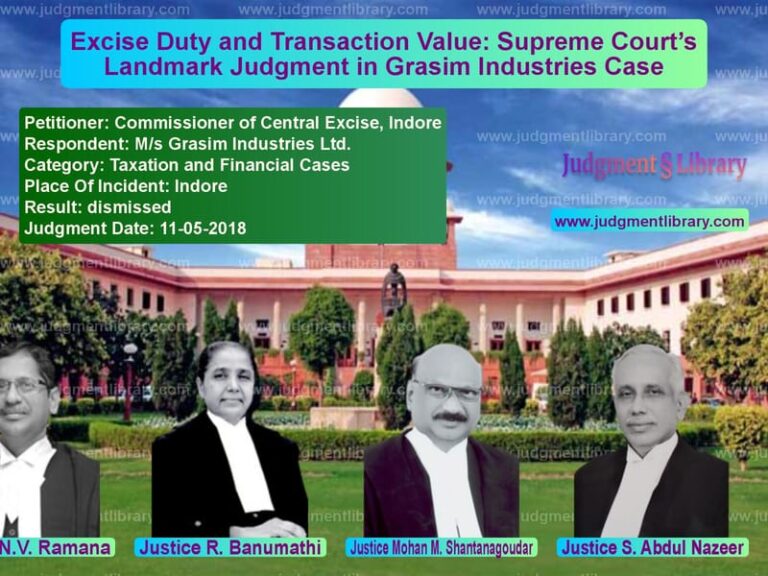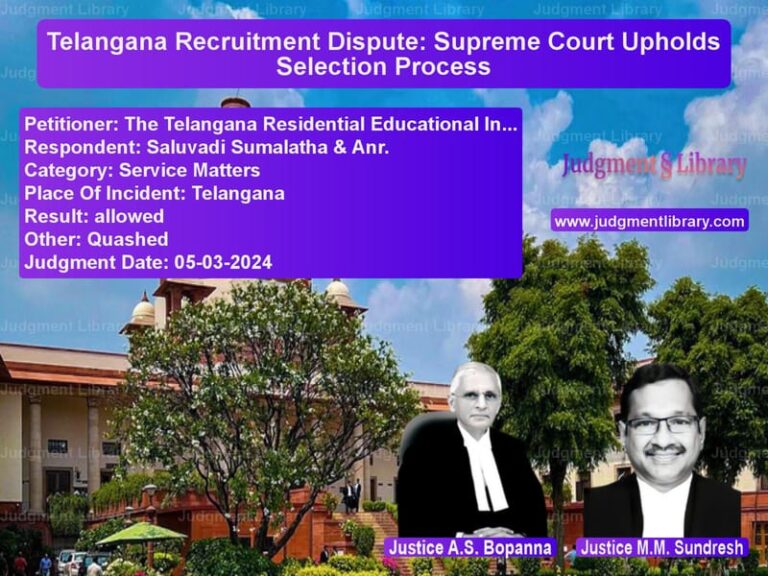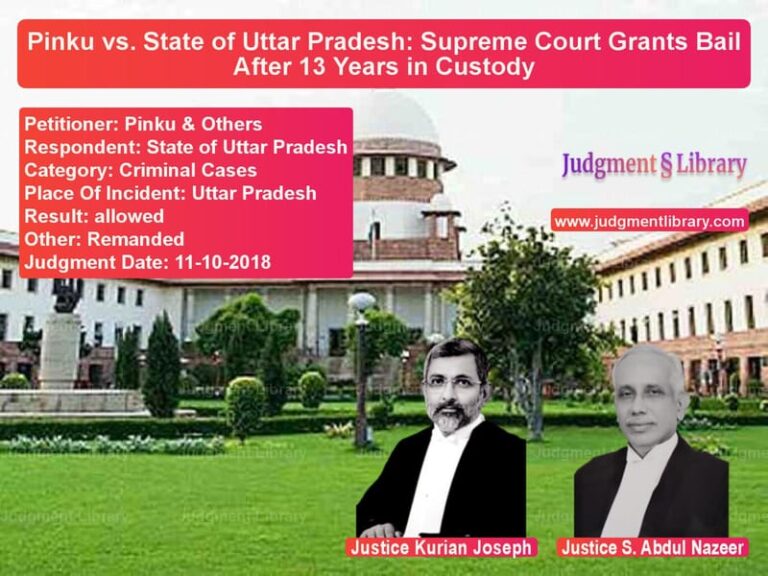Supreme Court Clarifies Land Acquisition Laws: Key Rulings and Legal Interpretations
The Supreme Court in Government of NCT of Delhi Through the Secretary, Land and Building Department & Another vs. M/s. K.L. Rathi Steels Limited & Others addressed significant legal questions regarding land acquisition and compensation under the Right to Fair Compensation and Transparency in Land Acquisition, Rehabilitation, and Resettlement Act, 2013. The case involved whether earlier judicial decisions, based on the now-overruled judgment in Pune Municipal Corporation v. Harakchand Misirimal Solanki, could be reviewed in light of the Supreme Court’s Constitution Bench ruling in Indore Development Authority v. Manohar Lal.
Background of the Case
The controversy arose when the Delhi Development Authority (DDA) and the Government of NCT of Delhi sought a review of multiple judgments where land acquisition was deemed lapsed under Section 24(2) of the 2013 Act. The basis of these earlier judgments was the ruling in Pune Municipal Corporation, which held that if compensation was not deposited in the landowner’s bank account, the acquisition process would be deemed to have lapsed. However, this interpretation was overturned in Indore Development Authority, where the Court held that non-deposit of compensation alone does not result in automatic lapse of acquisition.
Arguments by the Petitioners
- The Government of NCT of Delhi contended that judgments based on Pune Municipal Corporation were no longer legally valid after the Indore Development Authority ruling.
- They argued that land acquisition should not lapse merely due to non-deposit of compensation when possession had been taken.
- They asserted that the public purpose of land acquisition would be defeated if courts continued to follow an overruled precedent.
- It was further argued that the principle of retrospective application of judgments should apply, ensuring uniformity in land acquisition cases.
Arguments by the Respondents
- The respondents contended that the earlier judgments should be upheld under the principle of res judicata (finality of judicial decisions).
- They argued that landowners had already acted based on previous judicial pronouncements, and any reversal would cause undue hardship.
- The respondents asserted that allowing the review petitions would open a floodgate of litigation, disrupting settled land acquisition cases.
Supreme Court’s Observations
Retrospective Application of Indore Development Authority
The Court held that the ruling in Indore Development Authority had to be applied retrospectively, making it binding on all pending and future cases. The judgment stated:
“A ruling by a Constitution Bench clarifies the correct interpretation of law from the date of the enactment of the statute, and not from the date of the ruling.”
Finality of Judicial Decisions
The Supreme Court acknowledged the respondents’ argument regarding finality but held that incorrect legal precedents cannot be allowed to stand when they have been explicitly overruled.
“While finality is essential to judicial determinations, it cannot come at the cost of perpetuating a legally unsound principle.”
Impact on Public Interest
The Court noted that allowing previously lapsed acquisitions to stand would harm public interest, particularly in urban development projects.
“Land acquisitions for public projects should not be invalidated due to judicial interpretations that were subsequently found to be incorrect.”
Final Judgment
- The Supreme Court set aside the judgments that had declared land acquisition as lapsed based on Pune Municipal Corporation.
- The review petitions were allowed, and the previous orders were recalled.
- The civil appeals were restored to be heard afresh based on the correct legal position established in Indore Development Authority.
Impact of the Judgment
- Legal Clarity: Ensures uniform application of land acquisition laws across all cases.
- Public Projects Protected: Prevents disruption of essential government projects due to incorrect legal interpretations.
- Precedential Authority: Establishes that Constitution Bench rulings apply retrospectively.
Conclusion
The Supreme Court’s judgment in Government of NCT of Delhi vs. K.L. Rathi Steels Ltd. marks a significant moment in land acquisition jurisprudence. By applying the Indore Development Authority ruling retrospectively, the Court reinforced the principle that incorrect judicial interpretations must not disrupt legal consistency. This judgment provides much-needed clarity and will influence numerous land acquisition cases pending before courts across India.
Petitioner Name: Government of NCT of Delhi Through the Secretary, Land and Building Department & Another.Respondent Name: M/s. K.L. Rathi Steels Limited and others.Judgment By: Justice M.R. Shah, Justice B.V. Nagarathna.Place Of Incident: Delhi, India.Judgment Date: 17-03-2023.
Don’t miss out on the full details! Download the complete judgment in PDF format below and gain valuable insights instantly!
Download Judgment: government-of-nct-of-vs-ms.-k.l.-rathi-stee-supreme-court-of-india-judgment-dated-17-03-2023.pdf
Directly Download Judgment: Directly download this Judgment
See all petitions in Property Disputes
See all petitions in Landlord-Tenant Disputes
See all petitions in Specific Performance
See all petitions in Damages and Compensation
See all petitions in Judgment by Mukeshkumar Rasikbhai Shah
See all petitions in Judgment by B.V. Nagarathna
See all petitions in allowed
See all petitions in supreme court of India judgments March 2023
See all petitions in 2023 judgments
See all posts in Civil Cases Category
See all allowed petitions in Civil Cases Category
See all Dismissed petitions in Civil Cases Category
See all partially allowed petitions in Civil Cases Category







